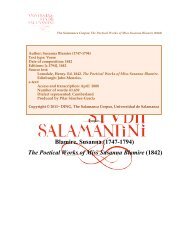DPBPMCC_Reyes Aragón_Utilidaddelatécnicadeautogeneración.pdf
DPBPMCC_Reyes Aragón_Utilidaddelatécnicadeautogeneración.pdf
DPBPMCC_Reyes Aragón_Utilidaddelatécnicadeautogeneración.pdf
You also want an ePaper? Increase the reach of your titles
YUMPU automatically turns print PDFs into web optimized ePapers that Google loves.
183<br />
Referencias<br />
impairment in patients with severe traumatic brain<br />
injury. Brain Injury, 20(5), 507-518.<br />
McMillan, T. (1991). Post-traumatic stress disorder and<br />
severe head injury. British Joiurnal of Psychiatry,<br />
159, 431-433.<br />
McMillan, T. (1996). Post-traumatic stress disorder<br />
following minor and severe closed head injury: 10<br />
single cases. Brain Injury, 10(10), 749-758.<br />
McMurray, D., & McIntyre, J. (1981). Depth of processing:<br />
Is there a semantic continuum? Australian Journal of<br />
Psychology, 33(2), 197-213.<br />
McNamara, D., & Healy, A. (1995a). A generation advantage<br />
for multiplication skill and nonword vocabulary<br />
acquisition. In A. Healy y L. Bourne Jr. (Eds.),<br />
Learning and memory of knowledge and skills:<br />
Durability and specificity (pp. 132-169). Oaks, USA:<br />
Sage.<br />
McNamara, D., & Healy, A. (1995b). A procedural explanation<br />
of the generation effect: The use of an operand<br />
retrieval strategy for multiplication and additional<br />
problems. Journal of Memory and Language, 34, 399–416.<br />
McNamara, D., & Healy, A. (2000). A Procedural Explanation<br />
of the Generation Effect for Simple and Difficult<br />
Multiplication Problems and Answers. Journal of Memory<br />
and Language, 43(4), 652-679.<br />
Mejia, S., Gutierrez, L., Villa, A., & Ostrosky, F. (2004).<br />
Cognition, Functional Status, Education, and the<br />
Diagnosis of Dementia and Mild Cognitive Impairment in<br />
Spanish-Speaking Elderly. Applied Neuropsychology,<br />
11(4), 194 - 201.<br />
Melton, A., & Bourgeois, M. (2005). Training compensatory<br />
memory strategies via the telephone for persons with<br />
TBI. Aphasiology, 19(3-5), 353-364.

















